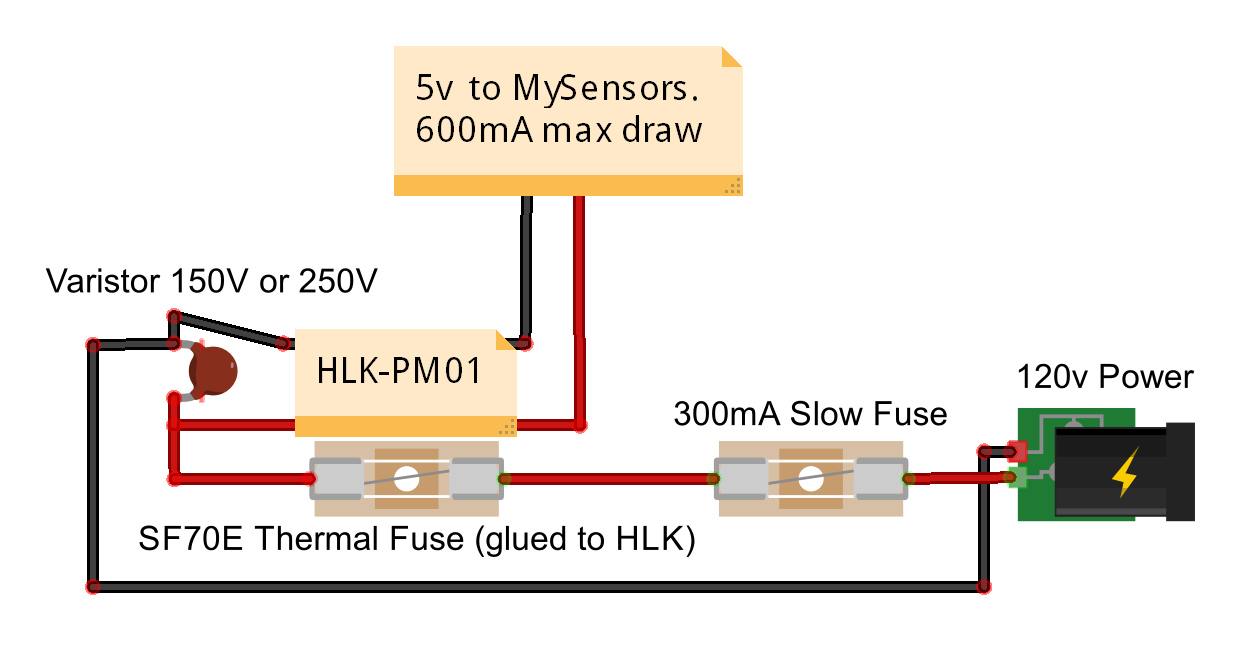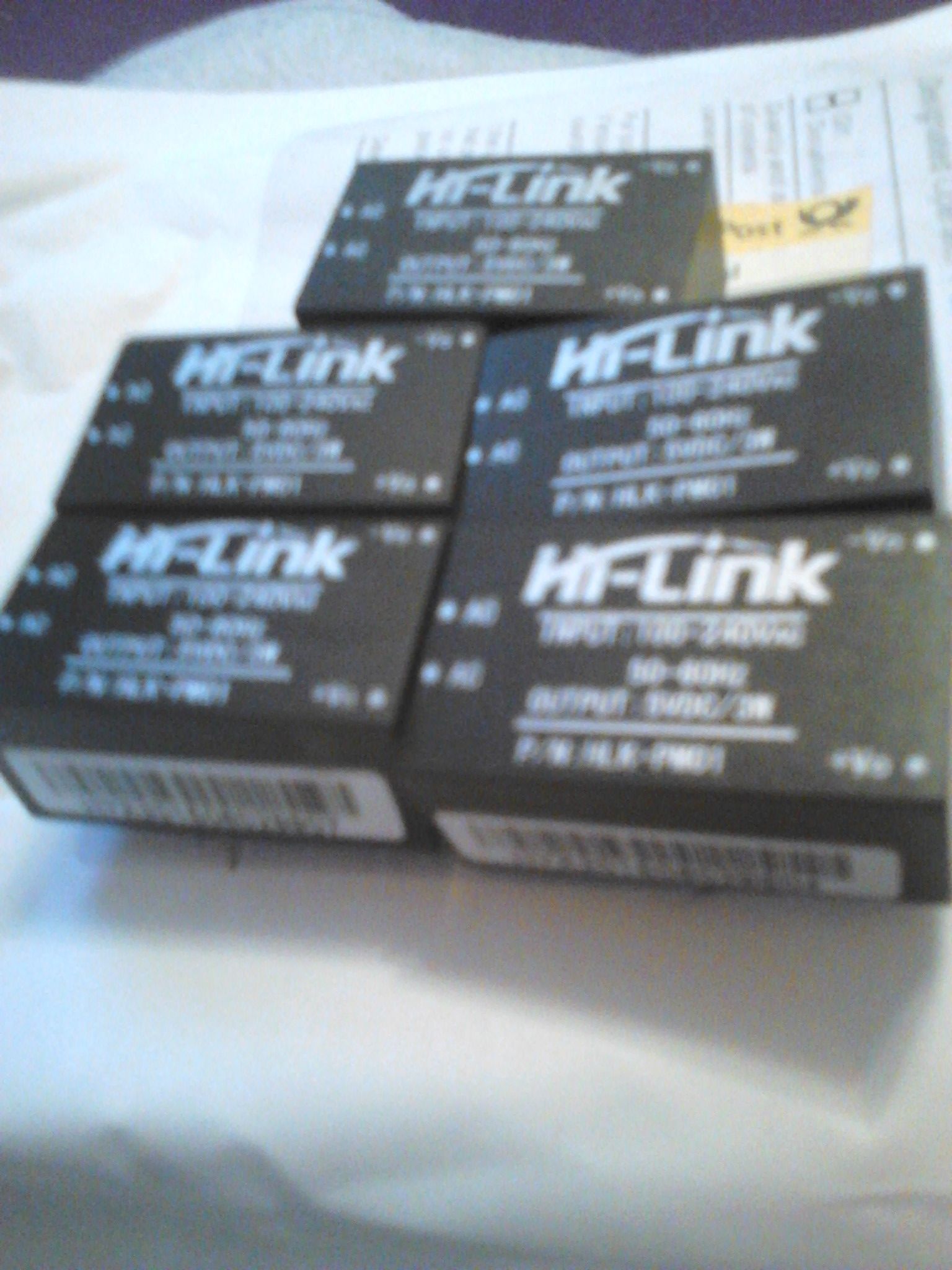Safe In-Wall AC to DC Transformers??
-
@petewill I have a supplier on ali that sells meanwell reasonably cheap. I used to buy all the power supplies for the LED lights I made from him. I will ask him for a quote. The downside is that he ships everything DHL.... still might be cheaper. where are you located?
-
@Moshe-Livne Ok, thanks! I live in Colorado, USA.
@petewill My supplier is not selling these :-(
apparently they are new
@jemish It is still a work in progress. @didi will do some tests and we are trying to get some more for testing.
Based on http://www.lygte-info.dk/info/indexUSB UK.html I would choose the apple one (http://lygte-info.dk/review/USBpower Apple USB power adapter UK.html)... But YMMV. I am not sure it has OTP -
so finally....plz...tell me which power supply is the best to put inside in the wall?
I want required 5v for Relay, arduino mini, and radio.
-
@ThinkPad Thanks for posting. It's good to see how the tests are performed. Unfortunately I don't have the equipment or skill to know how to test. Hopefully we will be able to find a safe one that we can all use.
@Moshe-Livne have you been able to find the meanwell chargers from anywhere besides jameco?
I have asked the guy who made this excellent list to test the meanwell - hopefully he will oblige. I still haven't been able to find anything with OTP even remotely in this price bracket....
@petewill said:
@ThinkPad Thanks for posting. It's good to see how the tests are performed. Unfortunately I don't have the equipment or skill to know how to test. Hopefully we will be able to find a safe one that we can all use.
@Moshe-Livne have you been able to find the meanwell chargers from anywhere besides jameco?
-
@jemish Be safe and buy something like: http://www.recom-international.com/pdf/Powerline-AC-DC/RAC03-SCR_277.pdf
Live on the edge (having a decent fire insurance) and tear down a USB charger or buy one of the few $$ versions from China . -
@Yveaux this RECOM AC to DC converter will safe or not for put it to in the wall.
because I have to start live HOME Automation.
-
-
@Yveaux thank you for your reply....
You mean that I can put this RECOM inside the wall box...behind the switch board. -
Does anyone know of any 120V AC to 5V DC transformers that are safe to put in a wall electrical box? I have been using old cell phone chargers for most of my projects but I was recently pondering putting something right in the wall. Since shipping can take so long I thought I'd ask now before I even start on the project.
I did some searching and couldn't find anything so I thought I'd ask the experts here.
Thanks in advance!
EDIT 9/7/2016
Watch out for Fakes! Read more here: https://forum.mysensors.org/topic/1607/safe-in-wall-ac-to-dc-transformers/355
If in doubt you can get them directly from the vendor here: http://www.hlktech.net/product.php?CateId=10EDIT 12/28/2015
After MUCH discussion on this here are the findings of this thread (as of now):Here is the diagram for how things should be wired:

These are the parts I ordered. I haven't tested any of these parts yet as this project has been put on the back burner for now :(. I am in the USA so this is spec'd for 120 VAC. If you're using 240 you will need to change the size of the Varistor but everything else should be fine for 240.
Also, see these posts for more discussion/ideas if interested:
http://forum.mysensors.org/topic/1540/110v-230v-ac-to-mysensors-pcb-board
http://forum.mysensors.org/topic/2488/in-wall-pcbVaristor for 120VAC - http://www.ebay.com/itm/321024816822?_trksid=p2057872.m2749.l2649&ssPageName=STRK%3AMEBIDX%3AIT
73°C Thermal Fuse - http://www.ebay.com/itm/221560426284?_trksid=p2057872.m2749.l2649&var=520415979885&ssPageName=STRK%3AMEBIDX%3AIT
250V 300mA Slow Blow Fuse - http://www.ebay.com/itm/111433875797?_trksid=p2057872.m2749.l2649&var=410420838583&ssPageName=STRK%3AMEBIDX%3AIT
HLK-PM01 - http://www.ebay.com/itm/351418782712?_trksid=p2057872.m2749.l2649&ssPageName=STRK%3AMEBIDX%3AIT
Pete
@petewill @didi found a cheaper source:
http://www.tme.eu/en/details/gs05e-usb/mains-power-supplies/mean-well/
shipping to the US 9.90. still ridiculously expensive but not as bad as mouser -
@Moshe Livne: interesting. I didn't know that tme has it. They have nice enclosure too, like those for wall ac adapter http://www.tme.eu/en/katalog/enclosures_100431/#id_category=100628&s_field=artykul&s_order=ASC&page=1
I live in EU. And for shipping I think they are good, regarding Rs, farnell, and mouser too. But not the same catalog unfortunately. -
@Moshe Livne: interesting. I didn't know that tme has it. They have nice enclosure too, like those for wall ac adapter http://www.tme.eu/en/katalog/enclosures_100431/#id_category=100628&s_field=artykul&s_order=ASC&page=1
I live in EU. And for shipping I think they are good, regarding Rs, farnell, and mouser too. But not the same catalog unfortunately.@scalz these are new i think and beibg propagated to shops. Every time I search i get more....
-
@Didi sharpening your knives and putting the plier in the fire?
-
aaaaaaah, you are lucky, I have not received mine yet!!!
I am thinking about something for OVP and OTP:- at my job we use MCP9509 for OTP. As OTP is for output load (and not for input I think), it could be possible to use MCP9509 and P Mosfet to cut off the load if any temp problems occurs. I think it could be sufficient like this.
- for OVP, why not using a varistance at the input??? And then if a problems, your fuse in your electrical service box would blow.
I think this module has others protection.. so maybe it could do the job. I am not sure but like this I think it couldn't burn. It is just an idea as I am not expert. But can't wait to see how it is inside!!!
-
Mine arrived too. But I don't have equipment / knowledge to test it properly. So I will go for "real-life test". The wall boxes / wires here are fire-proof (and placed into brick walls), so the risk of real fire is reduced.
And I'm running my Arduino-dimmers for 6 months now, all powered by really cheap phone charges, so hopefully these modules will be a bit safer ;-)
-
Mine arrived too. But I don't have equipment / knowledge to test it properly. So I will go for "real-life test". The wall boxes / wires here are fire-proof (and placed into brick walls), so the risk of real fire is reduced.
And I'm running my Arduino-dimmers for 6 months now, all powered by really cheap phone charges, so hopefully these modules will be a bit safer ;-)
@rvendrame would be interested to see how you wire everything together
-
@petewill @didi found a cheaper source:
http://www.tme.eu/en/details/gs05e-usb/mains-power-supplies/mean-well/
shipping to the US 9.90. still ridiculously expensive but not as bad as mouser@Moshe-Livne said:
@petewill @didi found a cheaper source:
http://www.tme.eu/en/details/gs05e-usb/mains-power-supplies/mean-well/
shipping to the US 9.90. still ridiculously expensive but not as bad as mouserCool, thanks!
@Didi can't wait to hear how they work! That was fast shipping!!

